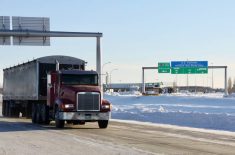Glacier FarmMedia — Feb. 24 marks two years since Russia’s invasion of Ukraine. It seems like a short time, but it has caused huge upheaval in our society. Hundreds of thousands have died and millions have lost their homes.
Ukraine’s agriculture was hit very hard by the war. Most of the country’s farmers were on the verge of impoverishment and were forced to learn how to survive. From these farmers you may learn which lessons are better to learn in peacetime, to better be ready for possible shocks.
Read Also

Stein appointed to manage AFA
The Alberta Federation of Agriculture has appointed Aaron Stein its new executive director. He’ll be leading the formulation of a five year strategic plan for the group.
Farmers usually follow recommendations when planting and growing crops or raising livestock. A farmer knows that for best results, he should apply a certain amount of fertilizer and spray the plants with the necessary pesticides to protect them. Careful cultivation and preparation of the field are also necessary.
But in the past two years, Ukrainian farmers were forced to learn to grow grain with minimal budgets. If they used to apply 600 kilograms of fertilizer to a hectare of land, today they grow a crop using 150 or 200 kg.
This forces them to look for other ways to nourish their crops. It also changes how closely they sow seeds and the spacing between rows. In many cases it has promoted wider use of inexpensive biostimulants, though it’s not proven they will help.
As I have observed farmers throughout the war, I have seen that the best results come from farmers who actively experimented before the war, and sought to reduce their cost of production even in peacetime.
While storing grain on the farm may be commonplace in Canada, it’s more limited in Ukraine. If a farmer doesn’t have a place to store the grain they grow, this can become a serious problem during wartime.
Overloaded regional elevators may refuse to accept crop for drying and storage. Grain can spoil. Due to the instantaneous increase in energy prices, the cost of grain elevator services may increase several-fold and it will be unprofitable for the farmer to use.
Therefore, it is better to have their own storage, even if it is primitive. This will give the farmer time to make the best decision.

During the war it is almost impossible to sell grain at a normal price, while the cost of fuel, animal feed and various food products is high. Many Ukrainian farmers began to process their produce and sell finished products to earn additional money. Farmers’ interest in animal husbandry has also increased. But it is clear it was better to start doing all this long before the war, in order to have the opportunity to perfect production processes.
In times of war, banks and supply companies have limited resources and lend money and resources only to guaranteed reliable customers. If a farmer has such a reputation, they have a better chance of finding financial support to grow a crop.
Ukrainians have a good saying: “Friends are known in trouble.” A farmer must have many friends and good acquaintances, including other farmers, managers of supply companies and neighbours. In times of war and other disasters, this makes it possible to get quick support and coordinate efforts to overcome a problem.
For example, overcoming the consequences of rocket fire or clearing snow after a heavy snowfall.
It is worthwhile to create regional farmers’ clubs and communicate regularly to know everyone personally. A farmer will not survive apart from other people.
Before the war in Ukraine, some financially secure farmers believed it was not necessary to own their own seeders, high clearance sprayers or combines.
They thought this machinery could be easily rented and the farm wouldn’t have to own and maintain it.
Today, agricultural companies that have their own agricultural machinery have the greatest chance of survival. It is more profitable, because the operating costs are lower than renting.
When there is a war in the country, all industries suffer, especially the provision of services. A farmer may simply not find a sprayer or combine in time.
So, if they have such an opportunity, they should buy their own agricultural machinery. It is also very useful to have their own excavators and trucks – especially trucks – because one of the biggest problems in wartime is logistics.
A farmer should try to buy fuel, fertilizers and pesticides for the next season as soon as they can afford it. This is what saved many farmers I know, when there was nothing to buy in the first months of the full-scale war.
Over time, the market normalized, but before that it was necessary to survive during four or five months of acute shortage of fuel, pesticides and spare parts, all during the spring sowing season.
No farmer should completely rely on third-party companies. If they have reliable and qualified employees, they should try to keep them at work.
In times of upheaval, it is better to have people around who know how to repair agricultural machinery and have a good knowledge of agronomy. A farm should have a few people it can rely on who are professional in their field.
Always keep in mind the possibility that electricity and natural gas may be out for extended periods of time. It is very good to have solar panels and wind generators and definitely diesel generators. Their power should be enough for basic life needs and to ensure the minimum functioning of a livestock farm.
It is very good if a farm can heat its buildings with firewood. This is an excellent backup option.

One of the biggest problems during the war is sudden disappearance of mobile communications and the internet due to missile attacks. A farmer can instantly lose touch with other people and won’t know what’s happening in the country or on the next street.
Therefore, farm workers must have wireless walkie-talkies and equipment that allows them to connect to the internet in the absence of electricity. Some farmers found that their traditional land lines worked best in these conditions.
A farmer who hopes to survive should not be paralyzed by fear, and should be ready to take control of their own destiny.
In times of wars and natural disasters, state bodies cannot save everything and help everyone at once. It makes no sense to sit back and wait for someone to come and solve problems.
Under such conditions, each farm turns into an island of stability for the surrounding residents. Farmers immediately take the initiative into their own hands. They provide people with food and organize people’s self-defence to maintain order. They solve infrastructure problems and organize support for the army.
This makes it possible to prevent social upheaval, because all people receive the necessary means of living and see that law and order has not disappeared.
These are hard lessons, learned over the past two years, and I hope Canadian farmers never have to learn them first-hand.
—Ihor Pavliuk is a farm journalist based in Ukraine who has filed regular contributions to Glacier FarmMedia publications over the course of the war.












